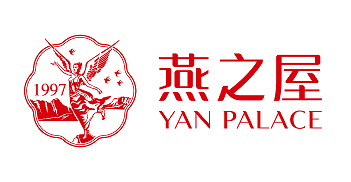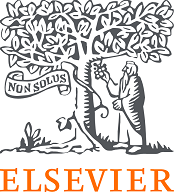3rd International Symposium on Bioactive Peptides
The 4th ISBP will be held at Kyoto University, Kyoto, Japan on June 9-11, 2025. Stay tuned for further information.
Interest in food-derived bioactive peptides is on the rise. Built upon our previous successful symposia, the first one held in Hangzhou (China) in 2017 and the second held in Valencia (Spain) in 2019, this Symposium aims to re-connect the professionals, after the pandemic, and to provide a platform that allows academia, industry and government to exchange ideas and share the latest knowledge and innovations in bioactive peptides, network and develop collaborations and partnerships among professionals in academia, industry, and governments, and, promote the growth and professionalism of a new generation of bioactive peptide researchers.
The theme of this year’s Symposium is Peptides from sustainable proteins, with a focus on 8 major topics dealing with 1) Efficient production of bioactive peptides, 2) Biocomputation and AI in bioactive peptides research, 3) Biostability, bioaccessibility, and bioavailability, 4) Advanced analysis (including Omics) of bioactive peptides, 5) Physiological mechanisms of action, 6) Tasting peptides, 7) Novel research directions on peptides (including gut microbiota), and, 8) From clinical evidence to consumer products. There will be a Student flash talk competition.
We welcome attendees from academia, industry, and government organizations. Young researchers and students are highly encouraged to attend to showcase their novel results and new ideas, to network, and, to grow their professionalism. Niagara Falls, Canada provides a vast array of year-round activities for all, and, with 24/7 shuttle service, is located 120 kilometers away from the Toronto Pearson International Airport.
We are very pleased to welcome you to Niagara Falls, Canada. We hope you will enjoy your participation at the Symposium and have an exciting and profitable experience.
Jianping Wu and Rotimi Aluko
Co-Chairs of the 3rd International Symposium on Bioactive Peptides
Program
Tentative Program
Wednesday, September 27,2023
- 14.00 – 18.00 Registration
- 18.00 – 20.00 Welcome reception
Thursday, September 28, 2023
- 8.00 –. Registration (will continue the full day)
- 8:00-8:30 Keynote (1)
1st session:
- 8.30 – 10.00 Invited lectures + oral communications
- 10.00 – 10.30 Coffee-break + posters exhibition
2nd session:
- 10.30 – 12.00 Invited lectures + Oral communications
- 12:00 — 13:00 lunch and coffee-break
- 13:00-13:30 Keynote (2)
3rd session:
- 13.30 – 15.00 Invited lectures + oral communications
- 15.00 – 15.30. Coffee-break + posters exhibition
4th session
- 15.30 – 17.00 Invited lectures + oral communications
- 17.00 – 19.00 Coffee-break + posters exhibition
- 17.30 – 18.30 Student flash talk competition
- 19.00 – 21.00 Gala dinner
Friday, September 29, 2023
- 8.00 –. Registration (will continue the full day)
- 8:00-8:30 Keynote (3)
5th session:
- 8.30 – 10.00 Invited lectures + oral communications
- 10.00 – 10.30 Coffee-break + posters exhibition
6th session:
- 10.30 – 12.00 Invited lectures + Oral communications
- 12:00 — 13:00 lunch and coffee-break
- 13:00-13:30 Keynote (4)
7th session:
- 13.30 – 15.00 Invited lectures + oral communications
- 15.00 – 15.30 Coffee-break + posters exhibition
8th session
- 15.30 – 17.00 Invited lectures + oral communications
- 17.00 – 17.15 Closing remarks
Registration Information
Regular Attendees - Early Registration
Before August 15, 2023
Price: Canadian Dollars 650.00 + 5% GST
Regular Attendees - Late Registration
After August 15, 2023
Price: Canadian Dollars 750.00 + 5% GST
Students - Early Registration
Before August 15, 2023
Price: Canadian Dollars 350.00 + 5% GST
Students and PDF - Late Registration
After August 15, 2023
Price: Canadian Dollars 450.00 + 5% GST
Gala Dinner
Price: Canadian Dollars 125.00 + 5% GST
Noted: You can submit your abstract and request a letter of invitation for visa application in the Register.
Preview Document
Abstract
We integrate Abstract submission with Registration. Please go to the Register for abstract submission.
Abstract submission deadline: August 15, 2023.
Invited Speakers
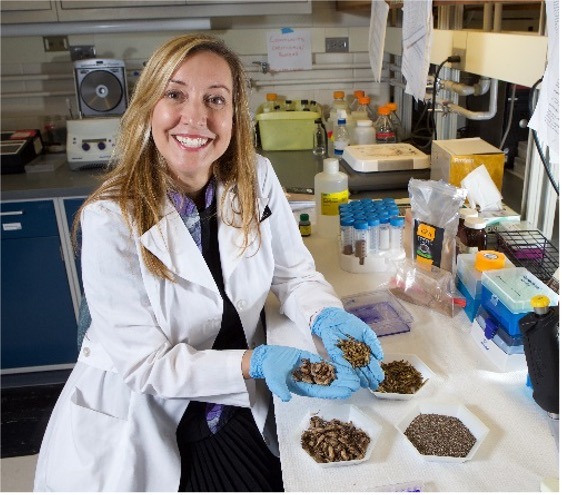
Andrea Liceaga
Purdue University, USA
Use of canary seed (Phalaris canariensis L.) peptides as potential anti-obesity nutraceuticals
Professor Andrea Liceaga has a PhD in food chemistry from The University of British Columbia. In 2009, she became a faculty member in the Food Science Department at Purdue University where she oversees the Protein Chemistry and Bioactive Peptides Laboratory. Dr. Liceaga has established her research efforts at fomenting the study of emerging proteins (e.g. insects, hemp, chia and hairless canary seeds) in food formulation to advance food security. Her research also looks at their allergenicity and potential biological activity for therapeutic use known as “foods for health”. She has over 50 publications that highlight the application of food proteins as novel ingredients for the food and pharmaceutical industries. Dr. Liceaga’s research on biological active peptides from traditional and emerging protein sources has generated new knowledge on the development, characterization, and mode of inhibition. In addition, as Director of the Sensory Evaluation Laboratory, Dr. Liceaga studies the sensory & consumer acceptability of these emerging proteins and also conducts daily consumer acceptability tests for the food industry sector.

André Marette
Laval University, Canada
Salmon protein-derived peptides for the treatment of cardiometabolic diseases: from the bench to the bedside
Dr. Andre Marette is Professor of Medicine and senior scientist at the Laval Hospital Heart and Lung Institute and Institute of Nutrition and Functional Foods at Université Laval. He holds a Research Chair on the pathogenesis of insulin resistance and cardiovascular diseases (CVD). Dr. Marette is an internationally renowned expert on nutrient sensing mechanisms implicated in the pathogenesis of obesity, type 2 diabetes and cardiometabolic diseases. He has made seminal contributions to our current understanding of metabolic inflammation and insulin resistance, such as the contribution of nitric oxide, and more recently on the key role of the microbiome in the development of the fatty liver disease and type 2 diabetes. He has discovered specific bioactive compounds derived from omega-3 fatty acids (protectin DX), various plants/fruits ingredients (polyphenols) and fermented dairy (branched-chain hydroxyacids) that can mitigate chronic inflammatory diseases in pre-clinical and clinical studies. His research has been published in >320 papers, reviews and book chapters. He has served as Editor-in-Chief for the Am J Physiol: Endo & Metab. from 2016-2022 and has authored two books. Dr. Marette has been recognized by several awards including the prestigious Charles Best Award and Lectureship from the University of Toronto for his overall contribution to the advancement of scientific knowledge in the field of diabetes.

Anna Paulina Barba de la Rosa
Instituto Potosino de Investigación Científica y Tecnológica (IPICYT), Mexico
Proteomic analysis of the interaction of NIH-3T3 cells with amaranth lunasin-like peptide: New insights into its mechanism of action
Dr, Barba de la Rosa joined IPICYT in 2001 at Molecular Biology Division. She has published over 130 peer-reviewed publications. She is member of National System of Researches in Mexico with the highest level (SNI, 3) and member of National Academy of Sciences since 2005. Dr. Barba has graduated 58 graduate students at the Master and Doctoral level and 23 undergraduate students. She has formed a research group investigated the molecular mechanisms of bioactive food components from seeds (amaranth, beans) and ethnic foods (Opuntia spp, Crotalaria longirostrata, Origanum vulgare). Dr. Barba research has focused on biopeptides characterization and phytochemicals extraction using supercritical fluid and their effects on obesity, diabetes, and cancer. Recently her work has focused on the role of biopeptides in gut microbiota modulation. She has received funding from UC-Mexus, federal government sources, industry, Framework Program (European Commission), and Bilateral Program Mexico-Japan. She has served as member of scientific evaluation committee of the National Council on Science and Technology (Mexico), President of Mexican Society of Proteomics and awarded from National Award on Food Science and Technology.

Carmen Lammi
University of Milan, Italy
Plant bioactive peptides for metabolic syndrome prevention
Carmen Lammi is Associate Professor in Food chemistry, Department of Pharmaceutical Sciences, University of Milan, Italy (UMIL). In the 2022, She got the National qualification for the function of Full Professor (SSD 03/D1 – CHIM10). (art. 16, comma 1, Legge 240/10).
She is responsible of the food chemistry/biochemistry laboratory of the Department, where her group of research studies mainly plant proteins and peptides for the development of innovative functional foods and dietary supplements for the prevention of chronic diseases and other pathologies. Her research activity on food derived peptides is mainly focused on the structure elucidation, investigation of the biological activity by cellular and in vivo studies, absorption and bioavailability evaluation at intestinal level, development of analytical methods by mass spectrometry, peptidomics.
She is a member of the collegium of the Doctorate in Pharmaceutical Sciences of UMIL. She has a consolidate experience as food biochemist and biotechnologist. She has published over 87 peer-reviewed papers at international journals, 4 invited book chapters and 5 patents/applications.
She is an Associate Editor of the Journal of Food Biochemistry, and Collection Editor on the Special Issue on “Bioactive Peptides: Challenges and Opportunities” to be published in the journal of Nutrients.

Elvira de Mejia (KEYNOTE)
University of Illinois, USA
Are plant proteins and peptides key contributors to good health?
Dr. Elvira de Mejia is a Professor in the Department of Food Science and Human Nutrition, University of Illinois (UI). Dr. de Mejia served as an Assistant Dean for Research, actively involved in mentoring undergraduate students in research, and junior faculty. She is the Director of the Division of Nutritional Sciences, a prestigious UI interdisciplinary graduate and research program. She is a UI Scholar, a UI Presidential Fellow, and Institute of Food Technologists Fellow. Dr. de Mejia is a Food Scientist with a globally recognized research program on the production and structure-function properties of food proteins and protein-derived bioactive peptides. She is considered a world leader in the health benefits of bioactive compounds from plant foods. Her research has led to increased understanding of the anti-cancer, anti-inflammatory and other physiological properties of plant foods. She identifies and characterizes the functional properties of food components, notably proteins and peptides in plant foods. Her research group investigates the role of processing on the presence, concentration, and physicochemical characteristics of proteins with biological potential and their safety; the health benefits of cereals and pulses, particularly the molecular mechanisms underlying their biological effects on chronic disorders. She dedicated her research to reduce disease and promote health and wellness as a global priority.
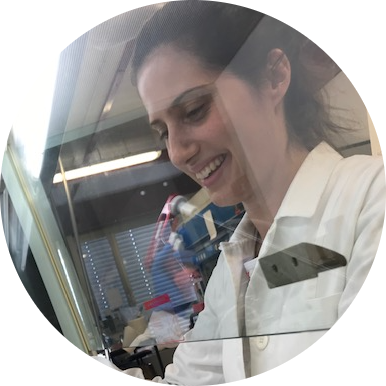
Federica Tonolo
University of Padua, Italy
The role of food-derived bioactive peptides in antioxidant and anti-inflammatory signalling pathway activation
Federica Tonolo received in 2016 her Master Degree summa cum laude in Sanitary Biology at University of Padua (Italy). In 2020 she achieved the PhD in Biomedical Sciences cum laude (Doctor Europeus) at University of Padua. Now she is a Research Associate at Dept. of Compared Biomedicine and Food Science (University of Padua). She gained four awards: two Best Presentation Awards (European society of clinical investigation-ESCI Virtual Meeting 2020 and DSB Annual Retreat “Science in the City”, 2022), the Young Investigator Award from SFRR-I (2021) and the prestigious Special Mention/Award “Premio di studio Elena Lucrezia Cornaro Piscopia” for her doctoral thesis in the field of nutraceuticals (2022). Her major field of interest is related to the mechanism of action in human cells of food-derived antioxidant bioactive peptides. Up to now (Apr 17, 2023) her scientific production includes 34 publications divided into 17 full papers and 17 meeting communications. (Total citations: 371, h-index: 10, source: Scopus).
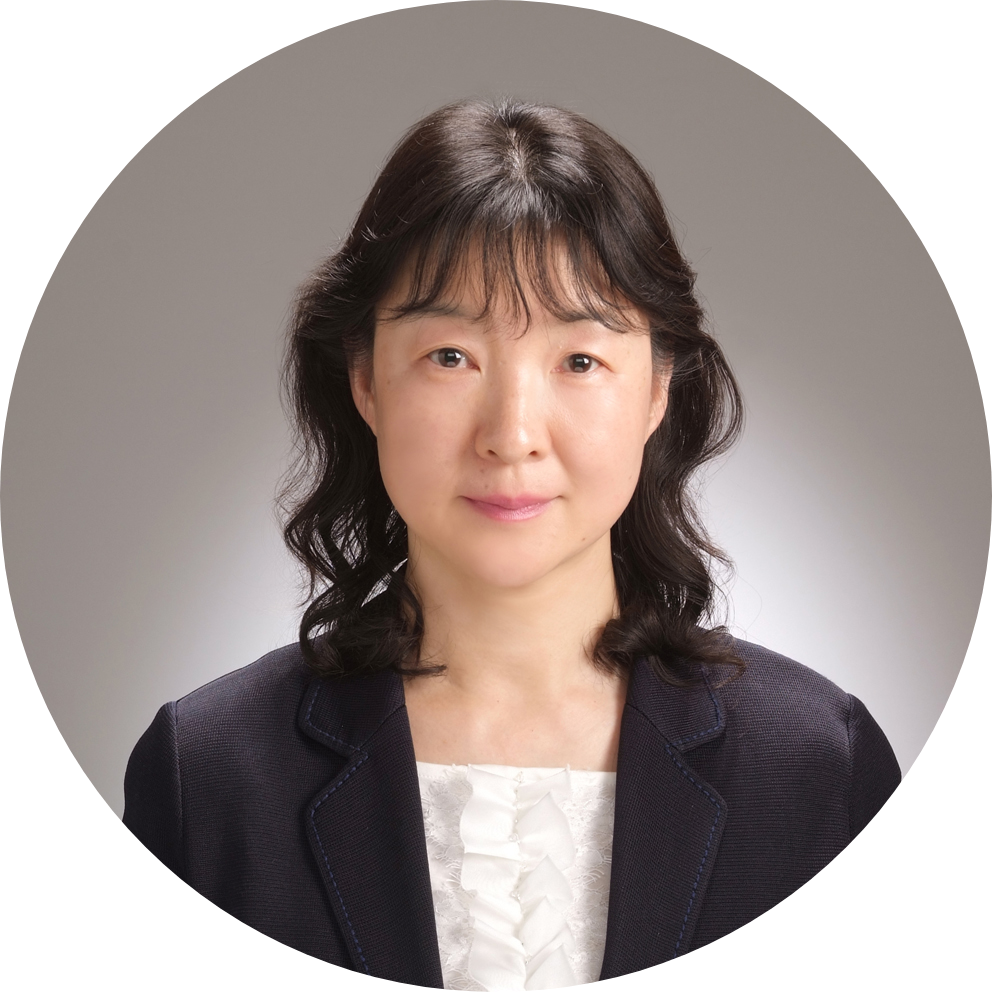
Hitomi Kumagai
Nihon University, Japan
Cereal albumin with functions to prevent postprandial hyperglycemia
Hitomi Kumagai is a full Professor in the Department of Chemistry and Life Science, College of Bioresource Sciences, Nihon University, Japan. She earned her Master's Degree in Food and Nutrition at Ochanomizu University and her Doctor's Degree in Agricultural Chemistry at the University of Tokyo. She joined the faculty at Nihon University after finishing the doctor’s course. She spent a year from March of 2000 at Nottingham University, UK as an Overseas Researcher. She received “The Award of Japanese Society for Food Science and Technology” in 2016 as the fourth female recipient out of 60. She is a Member of Science Council of Japan serving as a Chair of the Committee of Agricultural and Biological Chemistry, the Committee of IUNS, and the Committee of Gender Diversity in Life Science. She is also an Executive Board of IUFoST-Japan and IFT Japan Section. She wrote 21 book chapters and published about 110 papers in the peer-reviewed journals. Her current research interests are functions of food proteins and flavor-related compounds.

Isidra Recio
Spanish National Research Council (CSIC) at the Institute of Food Science Research (Madrid), Spain
Intestinal signalling of food peptides
Isidra Recio, PhD in Pharmacy by University Complutense of Madrid. Research Professor of the Spanish National Research Council (CSIC) at the Institute of Food Science Research, CIAL (CSIC-UAM) in Madrid (Spain). Co-author of more than 160 publications in indexed scientific journals These articles have been cited over 10,000 times without self-citations and she has an h-index of 55 (Web of Knowledge). She was awarded as Highly Cited Resercher from 2019 to date by this scientific citation index. Her research has been also oriented to the industry with 10 patent applications; two of them have been licensed to the industry.
Main research interests aim to study health implications of the protein fraction of foods, like bioactive peptides and their physiological effect when they are consumed, especially intestinal signalling of food protein digestion products. Other research activities include: the upgrade proteins by enzymatic hydrolysis, and fermentation to obtain products with enhanced functional and biological properties; development of cost-effective methods to produce functional ingredients. She is leading one working group within the INFOGEST network dedicated to the development and application of digestion protocols. She has worked at different international Institutes: NIZO food research (The Netherlands, 1997-2000) and AgroParisTech (France, 2013-2015).
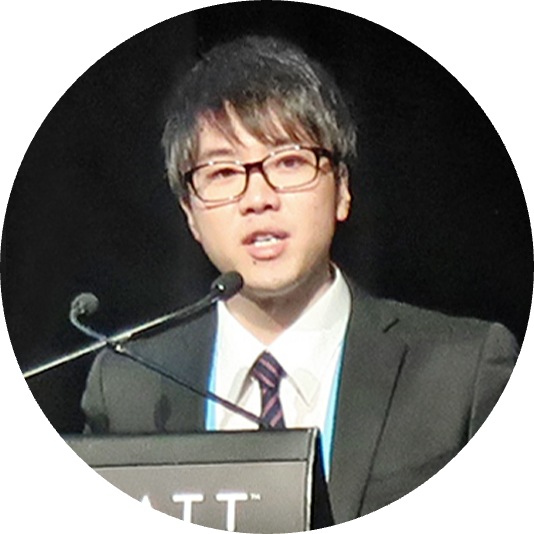
Issei Yokoyama
Nihon University, Japan
Evaluation of the anti-aging effect of peptides and their Maillard reaction products using a Caenorhabditis elegans model
Issei Yokoyama is a Japan Society for the Promotion of Science (JSPS) Research Fellowship. He earned a Ph.D. in animal science from Kitasato University, Japan. The doctoral dissertation was "The physiological activities of DMHF generated by the Maillard reaction and factors affecting DMHF generation in meats". His research attracted the attention of many people, and he was also given the best presentation award and the research encouragement award from Japanese academic societies. He is working in the Laboratory of Food Science and Nutrition, College of Bioresource Sciences, Nihon University. His research interests include food biochemistry and physiology, especially physiological effects of peptides and volatile odor compounds from animal products. He has been conducting research related to the anti-aging effect of odors generated from the Maillard reaction using a Caenorhabditis elegans model.

Jianping Wu
University of Alberta, Canada
Dr. Wu is a Professor and Director of the Division of Food Science and Bioresource Technology at the Department of Agricultural, Food and Nutritional Science of University of Alberta (Edmonton, Canada). His globally recognized research program focuses on food-derived bioactive peptides, and protein sustainability. He has published over 250 peer-reviewed articles, 15 invited book chapters, 3 edited books, over 250 presentations, and 4 patents. He is an associate editor for Journal of Functional Foods (since 2019.4), past associate editor for Food Science and Human Wellness (2014.9-2022.6) and past associate editor for Journal of the Science of Food and Agriculture (2012.1-2018.12), editorial board members of Food & Function, Journal of Functional Foods, Food Science and Human Wellness, and Journal of Future Foods. He is the past Chair of the Protein and Co-Products Division of the American Oil Chemists' Society (AOCS) and the Nutraceuticals and Functional Foods Division of Institute of Food Technologists (IFT), a regular organizer and chair of numerous scientific symposia/sessions, and is currently serving as the Chair-elect of International Society for Nutraceuticals and Functional Foods (ISNFF). He is the recipient of IFT Babcock-Hart Award (2021), Fellow of IFT (2023) and Fellow of Agricultural and Food Chemistry Division (AGFD) of American Chemical Society (2021).

Jiaoyan Ren
South China University of Technology, China
The biofunction of walnut-derived pentapeptides PW5 and WN5 in alleviating Alzheimer’s disease pathologies
Jiaoyan Ren , a professor at the South China University of Technology, was inducted into the National High-level Talent Program of the Ministry of Education, China in 2020. Her research centers on on food nutrition and health and mainly focusing on the application of bioactive peptides in health, chronic diseases and aging.
In terms of awards, she has won the second prize in Natural Science from the Ministry of Education and the second prize for Science and Technology from Guangdong Province. Thus far, she has published 102 SCI/EI papers as the first or corresponding author in international authoritative journals including JAMA, Gut, Brian Behaviour and Immunity and Molecular Nutrition and Food Research, with a total of 5362 citations. She owns 87 applied patents (3 PCT), among which 62 are authorized.
So far, she has presided over 3 projects of the National Natural Science Foundation of China, National Key R&D Program, and 14 other projects at the provincial and ministerial level.
Currently, she serves as the associate editor of "Food Frontiers", editorial board member of "eFood" and "Journal of Food Research and Development".

Kazunori Koba
University of Nagasaki, Japan
Multiple physiological functions of dietary soy β-conglycinin in rats
Kazunori Koba, Ph.D. is a Professor and Dean at Faculty of Nursing and Nutrition, University of Nagasaki, Nagasaki, Japan. Dr. Koba graduated from Kyushu University, Fukuoka, Japan in 1987 with a B.Sc. degree in Food Science and Technology (Agriculture). He received his Ph.D. degree from Kyushu University in 1992. He worked as a Postdoctoral fellow at Efamol Research Institute (Kentville NS, Canada) from 1992 to 1994 and as a Project Leader at Ross Products Division, Abbott Laboratories, (Columbus OH, USA) from 1994 to 1996. He became an Assistant Professor at Nagasaki Prefectural Women's Junior College, Nagasaki, Japan in 1996, and moved to Siebold University of Nagasaki (currently University of Nagasaki) in 1999. After serving as an Associate Professor, he has been a Professor since 2008. Meanwhile he served as Department Chair (2016-2022) at Department of Nutritional Science in the Faculty. He received the Young Investigator Award of the 2004's JSNFS (Japanese Society of Nutrition and Food Science). His research is centered on the nutritional effects of food constituents, including soy protein on lipid metabolism and metabolic syndromes.

Kenji Sato
Kyoto University, Japan
Peptides with high bioavailability and inhibitory activity against angiotensin converting enzyme in Japanese salted fermented soy paste (miso)
Dr. Sato holds a Ph.D. from Kyoto University (1988). He was Assistant Professor at the Faculty of Living Science, Kyoto Prefectural University (1989), Associate Professor at the Faculty of Human Environment, Kyoto Prefectural University (1995-2005), Professor at the Graduate School of Life and Environmental Sciences, Kyoto Prefectural University (2005-2014) and since 2014 he is Professor at the Graduate School of Agriculture, Kyoto University. He has received several awards like the Achievement Award for Young Scientists in Fisheries Science (1995), the Technology Award by The Japanese Society for Food Science and Technology (2014) and the Science Merit Award by International Society of Neutraceuticals and Functional Foods (2016). He is Associate Editor of Food Science and Technology Research (since 2016) and Associate Editor of Science of Food (since 2017).
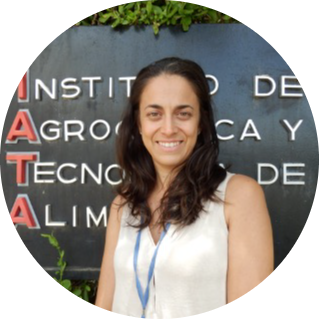
Leticia Mora
Institute of Agrochemistry and Food Technology (IATA-CSIC), Spain
Use of pretreatments in the generation of bioactive peptides obtained from animal by-products hydrolysis
Doctorate in Food Science and Technology from Universidad Politécnica de Valencia (2010) and currently Titular Scientist at the Institute of Agrochemistry and Food Technology (IATA-CSIC). L. Mora has published more than 120 articles in SCI-indexed scientific journals, 22 book chapters all in Wiley-Blackwell, Elsevier, and CRC Press editorials, and more than 60 contributions in congresses and workshops, many of them as invited speaker. She has participated in a total of 20 projects from different funds, being leader in some of them as the Career Integration Grant HIGHVALFOOD project FP7-PEOPLE-2013-CIG about the assessment of high added-value meat products, the National project AGL2017-89381-R about the sensory impact of small peptides, the National project PID2020-119684RB-I00 about the generation of taste-related peptides from meat by-products, and the project TED2021-132787B-I00 for the sustainable production of bioactive substances. She was also leader of a regional project to study the potential of meat by-products as a source of bioactive peptides and their bioaccessibility.
She has also evaluated projects from the State Research Agency (AEI, Spain), from the Research Council of Norway (RCN), and from the National Research Center in Poland (NSC), and she is member of the Editorial board of: Journal of Functional Foods (Elsevier, since 2021), Food Chemistry: Molecular Sciences (Elsevier, since 2021), and Foods (MDPI, since 2019), and Section Editor of Food and Humanity from Elsevier (since Dec 2022).
In this context, main scientific-technical achievements obtained by L. Mora have been (i) the use of biochemical compounds and peptides as quality biomarkers and the study of their post-translational modifications and impact on human health, (ii) the identification of functional peptides with bioactive and taste properties naturally generated and obtained through controlled hydrolysis techniques, study of their bioavailability, and (iii) the use of by-products as a sustainable source of functional ingredients.

Linda Giblin (KEYNOTE)
University College Cork, Ireland
Processing Map of Infant Milk Formula influences dairy protein digestion and bioactivity
Linda Giblin is a Principal Research Scientist at Teagasc, Ireland. She is a Cellular Biologist interested in food derived bioactive peptides, their digestion and bioavailability. She has >70 peer reviewed publications (39 as senior author) and 5 invited book chapters (h-index 31). Her lab has received >€4.8 million in research funding including 12 Industrial Research projects. She has supervised 10 PhD and 12 MSc postgraduates to completion, and mentored 10 post-doctoral scientists. She is a working group leader within the international INFOGEST network, and previously held a core leadership role in EU COST ACTION NutRedOxCA16112. She is an associate editor for the ‘Journal of Functional Foods’ and holds editorial roles in ‘Trends in Food Science and Technology’ and ‘Journal of Dairy Science’. She sits on the Industry Advisory Panel for Munster Technology University BSc (hons) Nutrition and Health Science programme. She is project manager of the Teagasc Food Biotest facility for food research in pigs. She has been an invited speaker at numerous international conferences, an external examiner for several PhD thesis and hosts at least 3 educational outreach activities per year. Her research has had national press coverage, most recently TV series ’10 things to know about’ series 7 episode 6.

Ming Du (KEYNOTE)
Dalian Polytechnic University, China
Advancement of the bioactive peptides industry in China
Dr. Du is a Professor and Vice-President of Dalian Polytechnic University, China. Dr. Du’s research focuses on the development and utilization of protein resources, and structure activity relationship study of food proteins and their derived bioactive peptides. Dr. Du is the Principle Investigator of 2 National Key Research and Development Plan projects, and key projects of the National Natural Science Foundation of China. He was awarded the 2nd Prize of the National Teaching Achievement Award, the 1st Prize of the Provincial Science and Technology Progress Award, the 2nd Prize of the Provincial Science and Technology Progress Award, the 2nd Prize of the Provincial Science and Technology Invention Award, and the 1st Prize for Scientific and Technological Progress Awarded by the Ministry of Education. Dr. Du has published more than 200 articles in peer-reviewed journals including Biotech Adv. and Nat. Commun., of 3 which are rated as ESI highly cited articles. His publication has a total citation of over 4600, with an H-index of 39. He edited or co-edited 12 books such as "Mineral Containing Proteins" and “Biologically Active Peptides”, granted 13 national patents, and developed a national standard for Oyster Peptides.

Richard J. FitzGerald
University of Limerick, Ireland
Marine protein hydrolysates/peptides: beneficial modulation of health enhancement biomarkers
Professor R. J. (Dick) FitzGerald holds a BSc in Biochemistry and PhD in protein chemistry/enzymology. He is a Professor (personal chair) at the Department of Biological Sciences at the University of Limerick, Ireland delivering modules to the Food Science and Health Degree and Masters programmes. He leads the Proteins and Peptides Research Group working in food protein ingredients. Research interests are in the technofunctional (solubility, heat stability, emulsification, etc) and biofunctional (specifically biologically active peptide) properties of proteins from a range of food sources (including dairy, plant, macroalgae, microalgae, fish and shellfish sources). He has published widely on food protein hydrolysate ingredients, see ResearchGate:

Rotimi Aluko
University of Manitoba, Canada
Evaluation of the bitterness intensity suppression ability of glycated beef peptides using electronic tongue and cell culture techniques
Dr. Rotimi Aluko is a Professor and Tier 1 Canada Research Chair in the Department of Food and Human Nutritional Sciences where he also serves as Director of the Richardson Centre for Food Technology and Research. He holds a PhD (Food Science) degree from the University of Guelph, Ontario, and has over 24 years of research experience as an independent investigator with a focus on the structure-function properties of food proteins and bioactive peptides. In addition to 285 peer-review journal article publications, he holds two patents on bioactive peptides, one of which was licensed to a Canadian nutraceutical company for the purpose of commercialization. He currently serves as Editor-in-Chief of the Journal of Food Biochemistry.
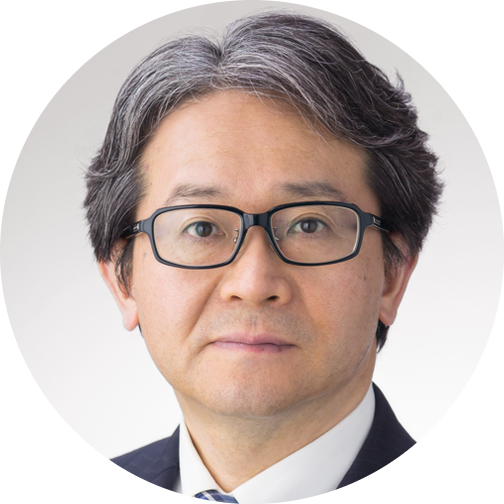
Satoshi Nagaoka
Gifu University, Japan
New insights of cholesterol lowering food derived peptides
Dr. Nagaoka is a Senior Professor (since 2012) & Professor (since 2007) of the Faculty of Applied Biological Sciences, Gifu University, Japan. He holds a Ph.D. in Agricultural Chemistry from Nagoya University in 1987, and was an Oversea Research Scholar (Ministry of Education) at the Boston University School of Medicine (USA). His research interests are molecular function of food with a focus on improvement of life-style related diseases especially, hyperlipidemia by food component and clarification of molecular function of food components (peptide and polyphenol). Dr. Nagaoka received numerous awards, such as Awardee of the Encouragement Award of the Japanese Society of Nutrition and Food Science (1996); Awardee of The Commendation for Science and Technology by the Minister of Education, Culture, Sports, Science and Technology (2005); Awardee of JSBBA Innovative Research Program Award (2005); Awardee of Staff of Gifu University commendation (2012); Awardee of the Excellent Research Award of the Japan Society of Nutrition and Food Science (2015); Awardee of Momofuku Ando Award (Excellence Prize) (2017); Awardee of Staff of Gifu University commendation (2018).
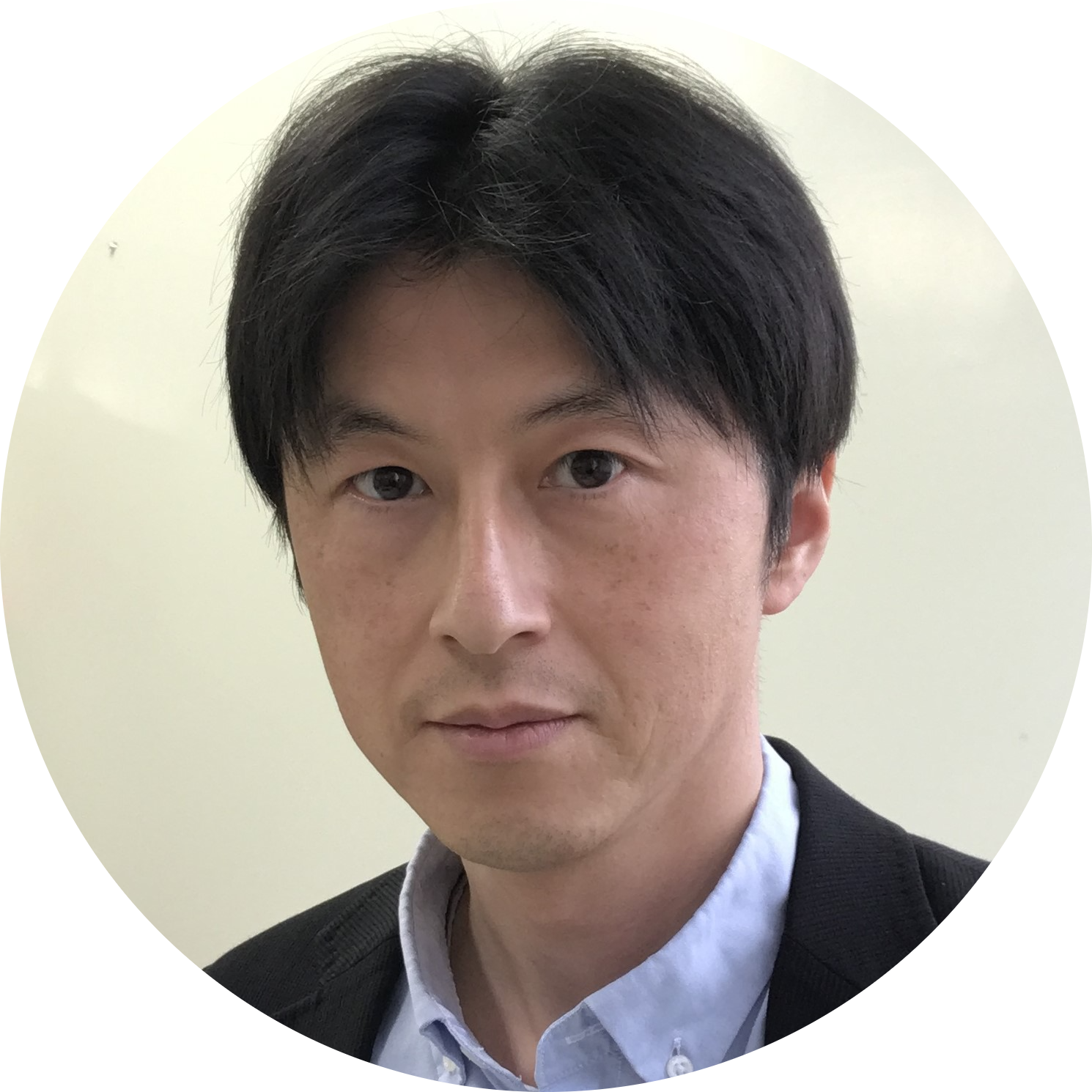
Shigeru Katayama
Shinshu University, Japan
Brain health benefits of peptides from Japanese fermented soybean (natto)
Shigeru Katayama is a Professor and Vice Dean for Education in the Faculty of Agriculture, Shinshu University (Nagano, Japan). He received his Ph.D. in Fisheries Science at Hokkaido University (Hokkaido, Japan) in 2004. He worked at Dr. Mine's laboratory at the University of Guelph (Ontario, Canada) as a postdoctoral researcher for two and a half years. He is currently serving as Professor since 2020. He has published more than 70 peer-reviewed papers, 3 invited book chapters, and 8 patents. He received "The Research Award of the Japanese Society for Food Chemistry" in 2017. He has been appointed as an Editorial board member of Bioscience, Biotechnology, and Biochemistry since 2021 and Japanese Journal of Food Chemistry and Safety since 2022. His research mainly focuses on the brain health benefits of food-derived bioactive peptides and the exploration of their underlying molecular mechanisms.

Silvia Montoro García
Catholic University of Murcia, Spain
Consumption of bioactive peptides from dry-cured pork ham in humans and its effect on blood pressure and glycaemic-lipid metabolism. Proteomic analysis of their biological activity on the cardiovascular system.
Silvia Montoro García is a molecular biologist and currently leads the research line "Preclinical research of bioactive compounds and drugs" at the Juan Carlos Izpisúa laboratory (Catholic University of Murcia, UCAM, Spain). After obtaining a Marie Curie grant, she consolidated as a principal investigator at the same institution.
During the course of the Marie Curie project, the in vitro effects of dry-cured pork ham derived biopeptides on an endothelial dysfunction model were investigated using various cell culture and molecular biology techniques at the UCAM. Besides, Dr. Montoro became familiar with clinical trials during her 3-year postdoctoral stay at the University of Birmingham (UK), where she participated in the recruitment and analysis of extensive clinical databases. In 2015, Dr. Montoro designed and supervised a clinical trial with healthy volunteers who consumed cured ham rich in biopeptides. In 2020, her group further explored the beneficial effects of these compounds by conducting a second clinical trial with patients with incipient cardiovascular pathology (supported by RETOS-COLABORATION project, Ministry of Industry, Spain).
Dr. Montoro's most current activity focuses on studies on biologically active organic compounds (primarily peptides and lipids), with the aim of defining the mechanisms of action and obtaining new molecules of therapeutic and biological interest, especially on the cardiovascular system inflammation and tumour processes.
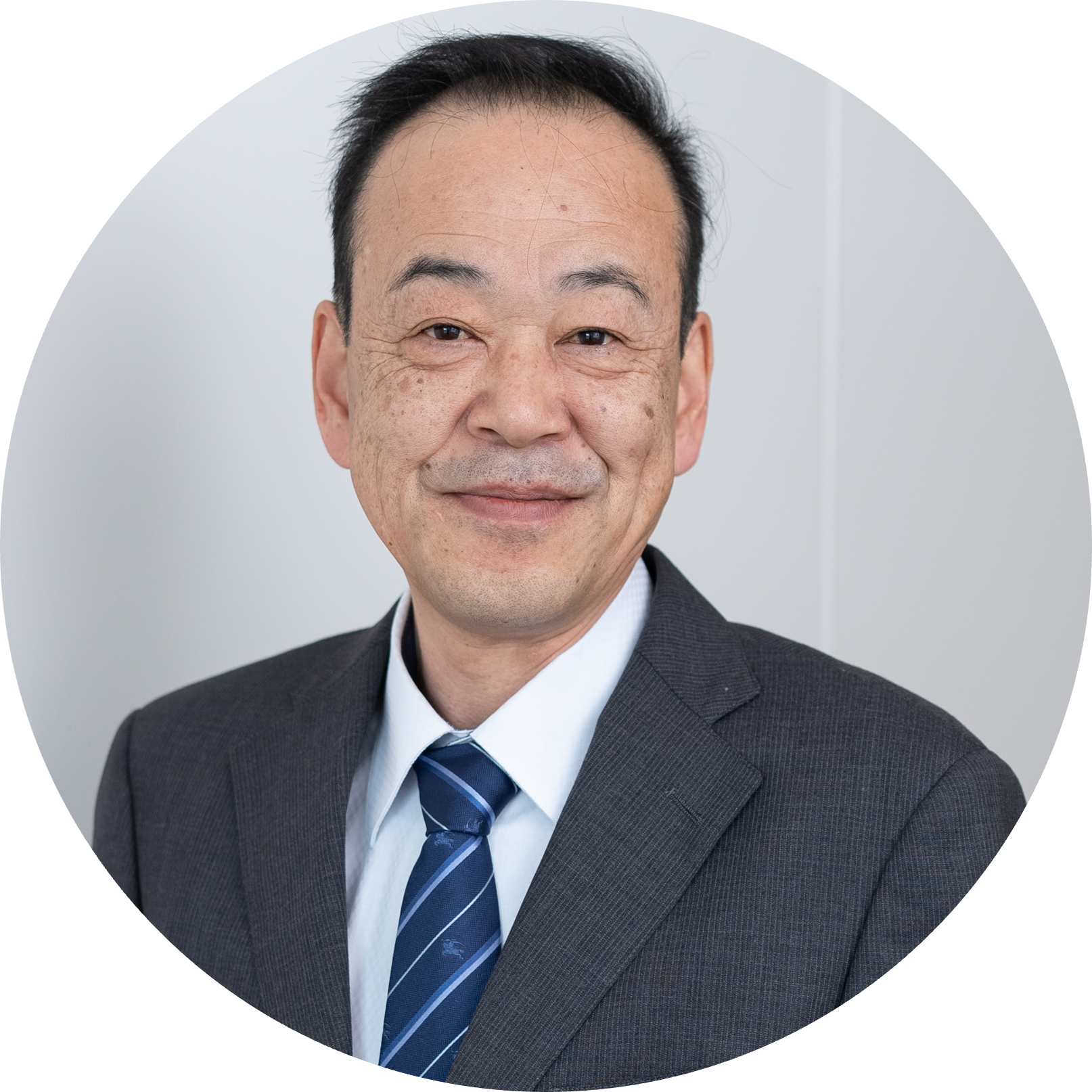
Toshiro Matsui
Kyushu University, Japan
Peptides with anti-cognitive impairment; transport and action in mouse brain
Dr. Toshiro Matsui is Professor at the Department of Bioscience and Bioenvironmental Sciences, Faculty of Agriculture, Graduate School and Dean of the Five-Sense Devise Research Center of Kyushu University, Japan. His research field is to prevent life-style related diseases such as hypertension and diabetes by food compounds and elucidation of their underlying mechanisms. He has published over 384 manuscripts, books and reviews. Professor Matsui holds a B.A. in Agricultural Chemistry, Kyushu University, Fukuoka, Japan (1986) and Ph.D. (D. Agric.), Agricultural Chemistry, Kyushu University, Fukuoka, Japan, (1991). He is the Vice President of the Japanese Society of Food Science and Technology, Editor of the Bioscience, Biotechnology, and Biochemistry, and Editorial board member of the Journal of Agricultural Food Chemistry. Professor Matsui was awarded the Commendation for Science and Technology by the Japan Minister of Education, Culture, Sports, Science and Technology, 2023.

Vermont Dia
University of Tennessee, USA
Lunasin isolated from tofu whey alleviated colitis in IL-10-/- mice and reduced the severity of colitis-associated cancer in mice
Vermont Dia is an associate professor at the Department of Food Science, The University of Tennessee Institute of Agriculture. He has a BS and MS degrees in Food Technology/Food Science from the University of the Philippines Los Baños and a PhD in Food Science and Human Nutrition from the University of Illinois at Urbana-Champaign. He is mentoring both undergraduate and graduate students’ research. His research focuses on biological activities of food-derived peptides and phenolics, and he is involved teaching an introductory class in Science of Foods, Food Chemistry, Food Toxins, and Food Product Development.

Yonghui Li
Kansas State University, USA
Accelerating bioactive peptides discovery with AI-powdered protein language models
Dr. Yonghui Li is an Associate Professor of Grain Chemistry and the Director of the Wheat Quality Lab at Kansas State University. He also serves as a graduate faculty member of the Food Science Institute at K-State. Dr. Li’s research focuses on the structure, chemistry, modification, and functionality of grain proteins and bioactive peptides with the aim of developing high-quality, functional grain-based foods, ingredients, and nutraceuticals. He and his team employ and integrate wet chemistry, engineering principles, computational simulation, and applied machine learning to deepen the knowledge and advance the research on proteins and peptides. Since joining the faculty in 2016, Dr. Li has received over $4.2 million in research funding, with $3.3 million awarded as the lead PI, from sources such as the USDA, Kansas grain commissions, and the grain and food industries. Dr. Li has published 110 journal articles, 130 presentations, 3 book chapters, and 2 patents. He is an associate editor for both Journal of Food Science and Cereal Chemistry and serves on the editorial boards of multiple international journals.

Yoshinori Mine (KEYNOTE)
University of Guelph, Canada
A 29-Year Journey Through Food Bioactive Peptide Research in Canada
Dr. Yoshinori Mine earned his Ph.D. Biochemistry from Tokyo University of Agriculture and Technology in Japan in 1993. Dr. Mine joined the University of Guelph (Ontario, Canada) in 1995 as a faculty member at Department of Food Science. Currently, he is a full professor (since 2005). He is a recipient of PREA (The Premier’s Research Excellence Award) in 2000 and American Egg Board Research award in 2005. Dr. Mine served on an Associate Editor for Journal of Agricultural and Food Chemistry journal (ACS publications) from 2010-2022 and editorial advisory board member of international journals of J. Functional Foods, Food Biosci., Int. J. Food Sci. Tech., and Nature-Sci. of Food. He is also actively involved in numerous international food and health related symposiums as an invited speaker and advisor of food and health ingredient companies. Dr. Mine’s primary research focus is food bioactives and gut health, particularly dietary peptides, amino acids and pro-/prebiotics as well as understanding molecular mechanism. Dr. Mine’s group has demonstrated a new proof of concept of long-term low grade chronic inflammation and potential risk of metabolic disorders, and receptor-mediated novel nutritional biochemistry of bioactive peptides. He has published 6 books, 42 book chapters, 15 review articles, and 172 original papers to the peer-reviewed international journals.
Organizing Committee
• Jianping Wu, University of Alberta, Canada, Chair
• Rotimi Aluko, University of Manitoba, Canada, Co-Chair
• Kaustav Majumder, University of Nebraska-Lincoln, USA
• Chibuike Udenigwe, University of Ottawa, Canada
• Apollinaire Tsopmo, Carleton University, Canada
• Xiaohong Sun, Dalhousie University, Canada
International Scientific Advisory Committee
• Dr. Andrea Liceaga, Purdue University, USA
• Dr. Toshiro Matsui, Kyushu University, Japan
• Dr. Kenji Sato, Kyoto University, Japan
• Dr. Hitomi Kumagai, Nihon University, Japan
• Dr. Du Ming, Dalian Polytechnic University, China
• Dr. Shaoyun Wang, Fuzhou University, China
• Dr. Jiaoyan Ren, South China University of Technology, China
• Dr. You-Jin Jeon, Jeju National University, Korea
• Dr. Maria Cristina Anon, Centro de Investigacion y Desarrollo en, Argentina
• Dr. Ana Paulina Barba de la Rosa, Instituto Potosino de Investigación Científica y Tecnológica A. C., Mexico
• Dr. Anna Iwaniak, University of Warmia and Mazury in Olszlyn, Poland
• Dr. Satoshi Nagaoka, Gifu University, Japan
• Dr. Carmen Lammi, University of Milan, Italy
• Dr. Sajid Maqsood, United Arab Emirates University, UAE
• Dr. Richard J. Fitzgerald, University of Limerick, Ireland
• Dr. Jianping Wu, University of Alberta, Canada
• Dr. Rotimi E. Aluko, University of Manitoba, Canada
Sponsors

Faculty of Agricultural, Life, and Environmental Sciences, University of Alberta

Richardson Centre for Functional Food and Nutraceuticals
Starter Sponsors:
Faculty of Agricultural and Food Sciences, University of Manitoba
Department of Agricultural, Food & Nutritional Science (AFNS), University of Alberta
Travel
No matter where you are travelling from, here you can find all the information that you will need to make your travel to Niagara Falls as straight-forward as possible.
There are four major airports in surrounding areas that charter airlines from around the world. Once you land, rental cars, airport limousines, trains, buses, airport shuttles and taxis are available to transport you to Niagara Falls.
Toronto Pearson International Airport (YYZ)
As Canada’s largest and busiest airport, Toronto Pearson International Airport sees nearly 50 million passengers annually. The airport is located 125 km (78 mi) from Niagara Falls, and is about an hour and half drive.
Billy Bishop Toronto City Airport (YTZ)
Located on Toronto Island, Billy Bishop Toronto City Airport welcomes nearly 3 million passengers annually from Canada and the U.S. via two airlines: Porter and Air Canada. The airport is located 127 km (79 mi) from Niagara Falls, and is just over an hour and a half drive.
John C. Munro Hamilton International Airport (YMC)
Seeing close to 350,000 passengers a year and serving several destinations across North America, Hamilton International Airport is less than a one hour drive to Niagara Falls.
Buffalo Niagara International Airport (BUF)
Located approximately a 45 minute drive from Niagara Falls, Canada, the Buffalo Niagara International Airport hosts approximately 100 non-stop flights a day. A reminder that even if you flew to Buffalo from a city within the United States, you will need a passport to cross the border into Niagara Falls, Canada.
There is small airport located in Niagara Region, called the Niagara District Airport. While no large commercial flights charter through there, flights to-and-from Toronto are scheduled regularly.
For more information on attractions and other transportation (train, bus, car), please visit Niagara Falls Tourism.
Shuttle service from airport to Niagara Falls
We have arranged a discount code 735 for your travel from airport to Niagara Falls. You simply need to go to www.niagaraairbus.com - at the beginning of the booking page, you will need to insert this code where you see Conference/Promo code - and your discount will automatically be calculated as long as the code is entered. We have set up at 30% shuttle discount for Toronto Pearson Airport. We have also provided a 10% discount on all private exclusive services for Toronto Pearson, Billy Bishop and Hamilton Airports. Code is valid booked 84 hours in advance of pickup.
Guests can book online and manage their own bookings with this code, and can also call our reservations line at 905-374-8111 should they have any inquires, or questions regarding bookings, or you they also email any inquiries to [email protected] as well, and provide the code to the reservation staff.
The code is valid for travel from September 20-October 6 - 2023 to allow ample time to travel before and after the event.
More Information:
On-line shuttle booking instruction (English - French)
Address: Marriott on the Falls, 6755 Fallsview Boulevard, Niagara Falls, ON, L2G 3W7, Canada
Accommodation
We are thrilled to host the 3rd International Symposium on Bioactive Peptides at the Niagara Falls Marriott on the Falls.
All sessions and events will be held onsite at the Niagara Falls Marriott on the Falls.
We have negotiated some very special room rates for our delegates and sponsors. Come and experience the magnificence of the Niagara Falls at an exclusive Peptide Symposium rate! Book early to secure your best rate!
Hotel(s) offering your special group rate:
- Niagara Falls Marriott on the Falls for 169 CAD - 219 CAD per night plus taxes and fees
Room rates are for single or double occupancy; triple and quadruple accommodation when available is at an additional rate of $25.00 per person. Children under the age of 18 stay free in the room with an adult, and rollaway beds are available at an additional rate of $25.00 each.
Parking available. Fees will apply.
Note: Our group includes complimentary Wifi and 2 bottled water. The website will quote a $15.95 amenity fee, our group is exempt from this fee, unfortunately the hotel cannot alter the website to remove it.
Online reservation for groups/individuals:
Individuals can also reserve by calling the hotel directly at 1-877-353-2557 and request the special convention rate ISB.
Space is limited so book early. If the system shows no room available for the nights of the Sept 26th and/or Sept 29th, please first book the nights of Sept 27th and 28th, and then forward the days you want to book to Dr. Wu ([email protected]). Dr. Wu will forward your request to the hotel so that we can try our best to arrange the group rate for you. Sorry for this inconvenience as the week is busy.
Last Day to Book (while space is available): Wednesday, August 30, 2023
Update: If any attendees wish to stay the night of the 29th, they would need to contact the Hotel Reservations (1-877-323-2557 or www.marriott.com) team to see what room types are still available and be booked at retail rate.
Register


